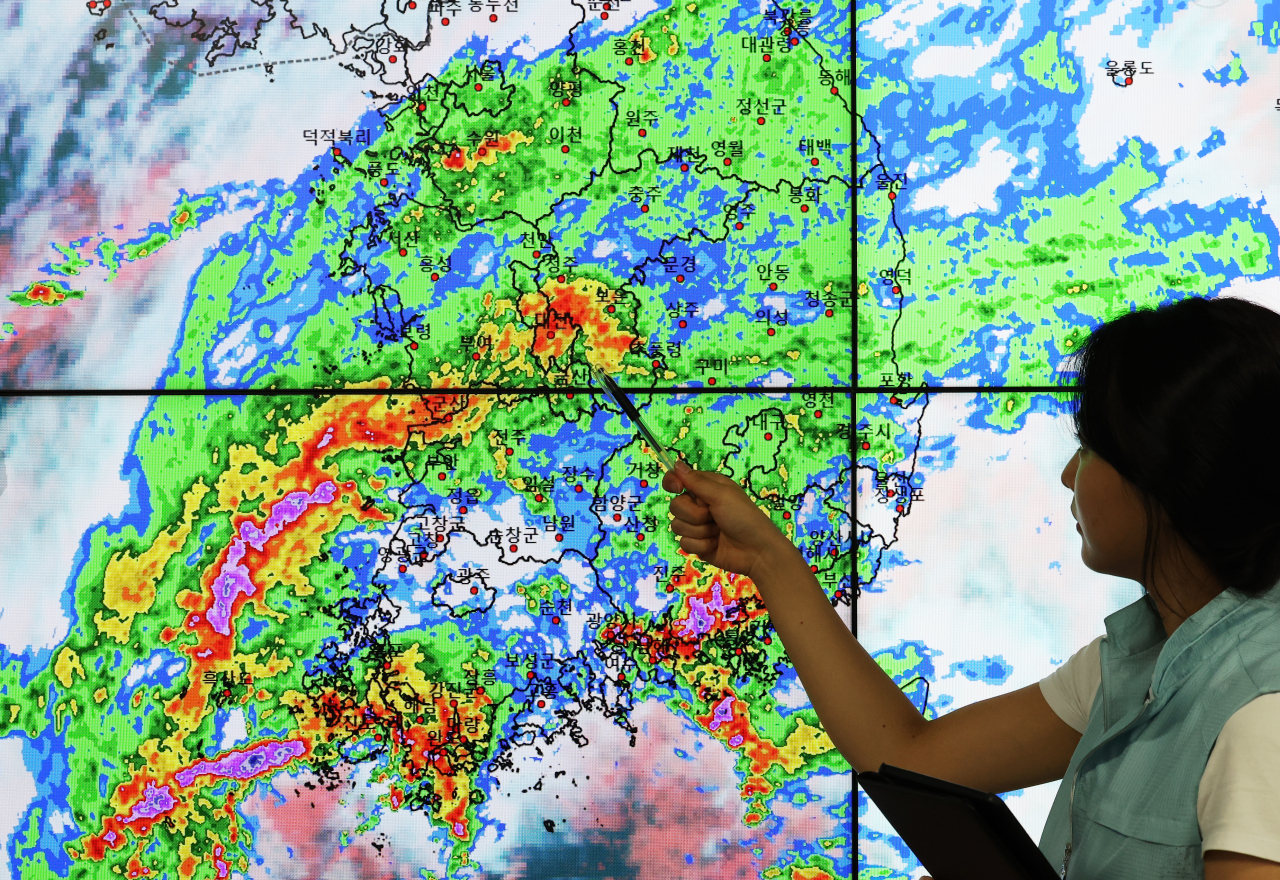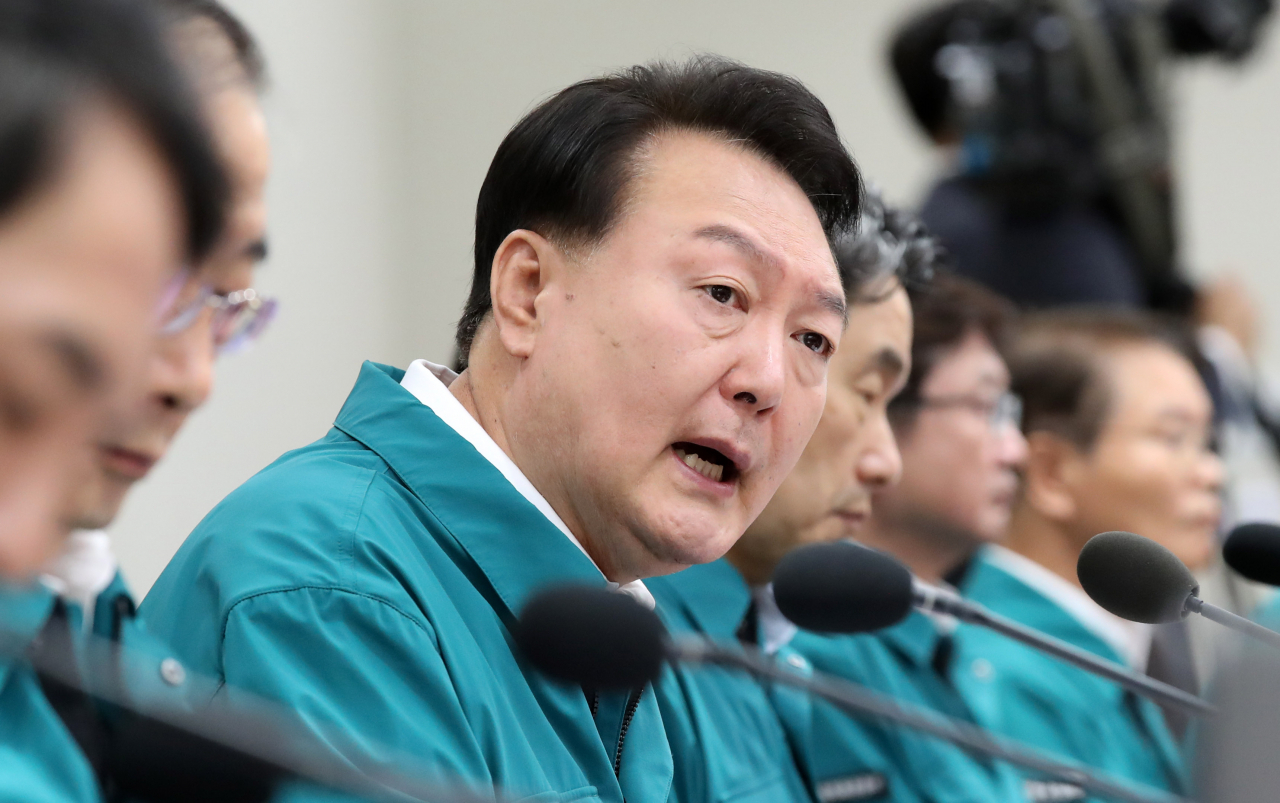Yoon orders speedy relief, declaration of disaster zones
By Son Ji-hyoungPublished : July 18, 2023 - 15:31

President Yoon Suk Yeol on Tuesday called for speedy disaster relief in areas battered by monsoon rains that have showed no signs of abating over the past couple of weeks, and hinted at designating affected areas as special disaster zones.
Yoon said in a Cabinet meeting in his office that the government will muster up all available resources such as state budget funds and aid workers by prioritizing rescue operations, recovery work and support for victims of the heavy rain.
"Citizens' precious tax money should be actively spent to wipe away the tears of the people who suffered from the disaster," Yoon said.
Special disaster zones will be designated beginning as early as Wednesday to provide financial assistance to people in affected areas, as onsite inspection for damage assessment is ongoing, according to Yoon's office.
Disaster relief should be provided in an aggressive manner, Yoon added.
"Subsidies going to corrupt cartels with vested interests must be stopped at once, and that money must be spent on flood recovery and damage repair," he said. No further explanation was offered by Yoon or his aides over the definition of a "cartel" or how the government plans to redeem the subsidies that went to them.
Ruling People Power Party's former leader Lee Jun-seok, a political detractor against Yoon, claimed Tuesday it was "erroneous" to use the political term in discussions of people's livelihood.
Yoon also called for an overhaul of the country's disaster management system and response method by introducing a "digital monitoring system," as South Korea witnesses "unprecedented" catastrophic events in which nearly 150 percent of the precipitation of an average monsoon season has already fallen.
"In the face of the unprecedented extreme weather events, we cannot, and should not, deal with them in the way we have done so far," Yoon said.
During the meeting, Yoon talked about his visit Monday to the scene of the deadly landslide in Yecheon-gun, North Gyeongsang Province. There, numerous boulders weighing hundreds of tons came loose due to the heavy rains and rolled down a mountain onto villages that were up to five kilometers away. Yoon also visited Gongju, South Chungcheong Province on Tuesday afternoon to inspect the heavily affected area.
"I have never seen this kind of collapse of a mountain before," Yoon said.
"We must abandon the notion that because it's an inevitable natural disaster, 'nothing can be done.'"
In this regard, a real-time, digital information-sharing system where all government entities are alerted in the case of a disaster, as well as digital simulations to identify areas vulnerable to flooding, should be implemented to ensure preemptive actions and prevent casualties, Yoon said.

A failure in information sharing across a number of government entities is to blame for the failure to act preemptively to close off roads like that of the underpass in Osong-eup, Cheongju, North Chungchung Province, in which the collapse of the Miho River bank led to deadly flooding in minutes that has claimed 14 lives so far.
The North Chungcheong provincial office is responsible for the road passing through the Gungpyeong 2 Underpass, where the tragedy happened, but alerts somehow did not reach the office.
The road is classified as a "local road" in the seven-tier administrative classification system that designates different government bodies as administrative authorities depending on the type of road.
Four hours before the flash flooding happened after the river bank collapsed at 8:40 a.m. Saturday, the Geum River Flood Control Office, which oversees the bodies of water around the Geum River and its tributaries, including the Miho River, reportedly notified 76 government entities -- including the provincial office, the Cheongju city office and the Heungdeok-gu ward office -- at 4:10 a.m. that a flood warning was in place for the Miho River.
But at 6:30 a.m., the river flood control authority failed to ask the provincial office to control traffic near the Miho River and order residents there to evacuate. Instead, it asked the ward office to do so.
The ward office reported the alert to the city office, but the message reportedly failed to reach the provincial office.
This failure came in combination with the government's failure to address people's emergency calls to the police and fire department concerning the flooding.
Hours later, the collapse of a makeshift embankment at a construction site inundated the underground tunnel, while the tunnel's own drainage system suffered a breakdown due to the heavy rain.
While a police probe launched Monday is underway and those responsible for the deadly flooding are potentially facing criminal charges, all eyes are on whether those held accountable for the leniency could face harsher criminal punishment by legally interpreting the disaster as a "serious civic accident" under the Serious Accidents Punishment Act.
If the incident is deemed a "serious civic accident," those responsible might face at least one year of imprisonment or fines up to 1 billion won ($793,100). Otherwise, criminal charges of occupational negligence will subject those convicted to prison terms of not more than five years or fines not exceeding 20 million won.
Korean law enforcement has never sought charges against anyone for failing to prevent a serious civic accident, since the introduction of law in 2021.
Je Jin-ju, a former bureaucrat and professor of fire prevention engineering at the University of Seoul, said it is highly likely that the deadly flooding of the underpass could be seen as a serious civic incident, given the casualties that the tragedy has caused, and the inundated road could be seen as a public-use facility under the law.
Fourteen victims from the flooding of the underpass in Cheongju are among the casualties due to the torrential rains in Korea. A total of at least 50 people were either dead or missing as of Tuesday afternoon.







![[Weekender] Geeks have never been so chic in Korea](http://res.heraldm.com/phpwas/restmb_idxmake.php?idx=644&simg=/content/image/2024/05/16/20240516050845_0.jpg&u=)










![[Herald Interview] Byun Yo-han's 'unlikable' character is result of calculated acting](http://res.heraldm.com/phpwas/restmb_idxmake.php?idx=652&simg=/content/image/2024/05/16/20240516050855_0.jpg&u=)
